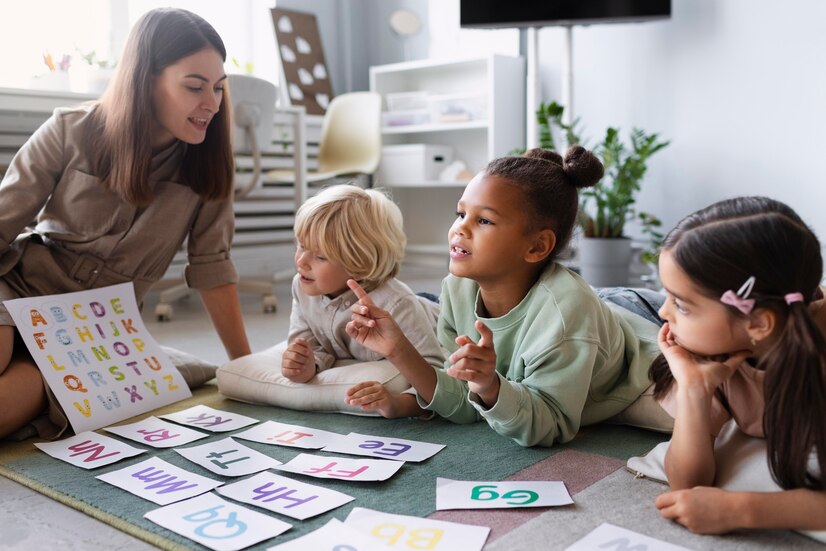Introduction
Play is more than just fun and games for young children. It’s an essential part of their development, fostering crucial skills and knowledge that will benefit them throughout their lives. Play-based learning, an approach that integrates learning into play activities, is recognized as a highly effective method for early childhood education.


What is Play-Based Learning?
Play-based learning is a child-centered approach that allows children to learn through active exploration, experimentation, and interaction with their environment. It emphasizes hands-on experiences, open-ended activities, and opportunities for children to make choices and take risks.
Benefits of Play-Based Learning
Play-based learning offers numerous benefits for young children, including:
Cognitive Development: Play stimulates brain development, enhancing problem-solving, critical thinking, and creativity.
Social and Emotional Development: Play helps children develop social skills, learn to cooperate and share, and manage their emotions.
Physical Development: Play promotes physical activity, coordination, and motor skills development.
Language Development: Play encourages children to communicate, use their imaginations, and expand their vocabulary.
Self-Confidence and Self-Esteem: Play allows children to explore their abilities, take risks, and build self-confidence.
Play-Based Learning in Early Childhood Education
Play-based learning is widely adopted in early childhood education settings, including preschools, daycare centers, and Montessori schools. Educators incorporate play into various activities, such as:
Open-ended play: Providing materials like blocks, puzzles, and art supplies for children to explore freely.
Dramatic play: Encouraging children to role-play and act out stories and situations.
Sensory play: Engaging children’s senses through activities involving water, sand, and textures.
Outdoor play: Allowing children to explore nature, climb, and run freely.
Educational games and activities: Integrating educational concepts into playful activities.
The Effects of Play-Based Learning
Research has consistently shown the positive effects of play-based learning on children’s development. Studies indicate that children who engage in regular play-based learning demonstrate:
- Higher academic achievement
- Improved social skills and emotional regulation
- Enhanced creativity and problem-solving abilities
- Greater self-confidence and motivation


Play-Based Learning for Early Childhood Development
Parents and caregivers can easily incorporate play-based learning into their daily routines. Here are some tips:
- Provide a variety of play materials: Offer open-ended toys, art supplies, and materials that encourage exploration and imagination.
- Engage in play with your child: Actively participate in their play, follow their lead, and ask open-ended questions.
- Create opportunities for outdoor play: Encourage your child to play outdoors, explore nature, and engage in physical activity.
- Visit museums, libraries, and other educational settings: Expose your child to new experiences and opportunities for learning through play.
- Enroll your child in a play-based preschool or daycare: Choose an early childhood education program that prioritizes play and active learning.
Conclusion
Play-based learning is an invaluable tool for early childhood development. By providing children with opportunities for playful exploration, we can help them develop essential skills, knowledge, and a lifelong love of learning. Remember, play is not just fun; it’s the foundation for a child’s future success.
Ready to unlock the power of play-based learning for your child? Contact Duo Kids Chlld Care today! We offer a play-based preschool program that nurtures your child’s development through engaging activities, personalized attention, and a nurturing environment.
Call us on +1 (561) 460-8587 or reach us through info@webuycentralvalley.com for Child Care Programs.
FAQ
1. What age range is suitable for play-based learning?
Play-based learning is suitable for children from infancy through early elementary school age. It can be adapted to meet the developmental needs and interests of children at various stages of early childhood.
2. How can parents encourage play-based learning at home?
Parents can encourage play-based learning at home by providing a variety of open-ended toys and materials, engaging in imaginative play with their children, incorporating outdoor playtime, and participating in activities that promote creativity and exploration.
3. What are some signs that my child is benefiting from play-based learning?
Signs that your child is benefiting from play-based learning include increased curiosity and engagement, improved problem-solving skills, enhanced social interactions with peers, greater independence in play, and a positive attitude towards learning new concepts and skills.
